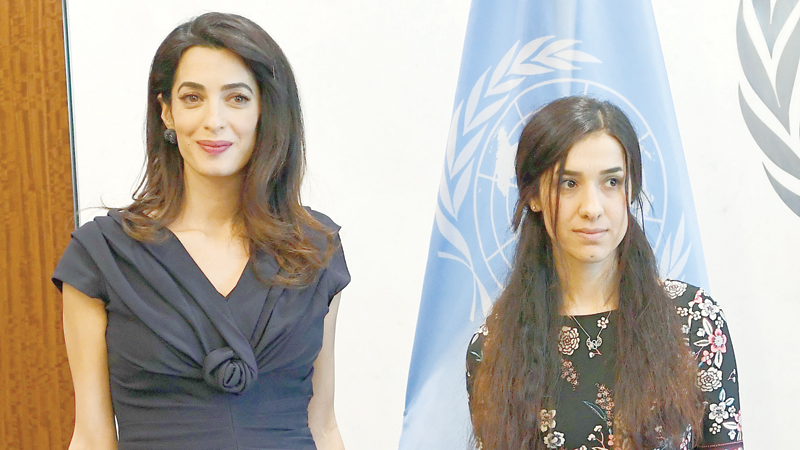

Baghdad: Nadia Murad survived the worst cruelties inflicted on her people, the Yazidis of Iraq, before becoming a global champion of their cause and winning the Nobel Peace Prize.
The 25-year-old Murad, her thin, pale face framed by her long brown hair, becomes the first Iraqi to win the Nobel Peace Prize.
She once lived a quiet life in her village in the mountainous Yazidi stronghold of Sinjar in northern Iraq, close to the border with Syria.
But when the so-called IS group stormed across swathes of the two countries in 2014, her fate changed forever and her nightmare began.
One day in August that year, pick-up trucks bearing the black flag of the IS swept into her village, Kocho. IS fighters set about killing the men, taking children captive to train them as fighters and condemning thousands of women to a life of forced labour and sexual slavery.
Today, Murad and her friend Lamia Haji Bashar, joint recipients of the EU’s 2016 Sakharov human rights prize, continue the fight for the 3,000 Yazidis who remain missing, presumed still in captivity.
IS fighters wanted “to take our honour, but they lost their honour,” said Murad, now a United Nations goodwill ambassador for survivors of human trafficking.
It is an evil she personally experienced during a harrowing three months. After being captured by IS fighters, Murad was taken by force to Mosul, the de facto “capital” of the IS’s self-declared caliphate.
During her ordeal, she was held captive and repeatedly gang-raped, tortured and beaten.
The IS organised slave markets for selling off the women and girls, and Yazidi women were forced to renounce their religion. Like thousands of Yazidis, Murad was forcibly married to an extremist, beaten and forced to wear makeup and tight clothes — an experience she later related in front of the United Nations Security Council. Shocked by the violence, Murad set about trying to escape, and managed to flee with the help of a Muslim family from Mosul.
Armed with false identity papers, she managed to cross the few dozen kilometres to Iraqi Kurdistan, joining crowds of other displaced Yazidis in camps. There, she learnt that six of her brothers and her mother had been killed. With the help of an organisation that assists Yazidis, she joined her sister in Germany, where she lives today.
She has since dedicated herself to what she calls “our peoples’ fight”, becoming a well-known spokeswoman even before the #MeToo movement swept the world.
The Yazidis numbered around 550,000 in Iraq before 2014, but some 100,000 have since left the country.
Many others have fled and remain in Iraqi Kurdistan, reluctant to return to their traditional lands.
Slight, and softly-spoken Murad has now become a global voice, campaigning for justice for her people and for the acts committed by the IS to be recognised internationally as genocide.
And she and the Yazidis have won a high-profile supporter — Lebanese-British lawyer and rights activist Amal Clooney, who also penned the foreword to Murad’s book, The Last Girl, published in 2017. — AFP
Oman Observer is now on the WhatsApp channel. Click here



